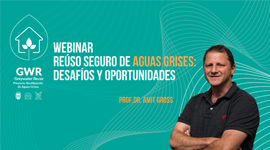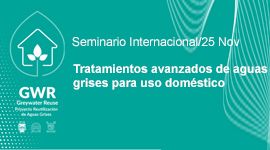You are here
Reusing graywater can save up to 70 percent of this resource.

"Water is scarce in this part of the world, especially in the Negev Desert," he commented at the beginning of his presentation. He explained why they are allocating 70 researchers to finding more efficient ways to use water.
However, he insisted that this is not an isolated phenomenon. "According to the UN, 45% of the world's population lives in arid areas, and this percentage is growing. We must take into account that water is a finite global resource, 95% of which is unavailable to us".
"The little surface water that we have is not enough. As the population grows, demand increases. It is also subject to contamination by human activity, so many water resources are not suitable for consumption", Dr. Gross emphasized.
According to the expert, "There is a lot of room for improvement. For example, in agriculture, we irrigate about three times more than a plant actually needs. Agricultural water demand currently accounts for 70% of total consumption, and this figure is projected to reach nearly 90% by 2050".
Apart from optimizing use, he emphasized that new resources must be sought. "There is no doubt that gray water can be separated from black water, and by reusing it, we can save up to 70% of the resource".
Challenges for Safe Reuse
Regarding the strategy for addressing reuse, Dr. Amit Gross said that there is no single recipe because the scale must be considered. For example, a single-family home is not the same as a building. Consumption habits and the technologies used for emptying toilets also vary from country to country, which modifies the proportion of graywater.
He also emphasized that there are several challenges associated with graywater reuse, which he divided into three main categories. "One is physical and relates to the fact that wastewater pipes are designed for a certain amount of liquid and solids. The flow can become complicated if we remove 60% of the water present. If we develop graywater reuse on a larger scale, this issue will have to be taken into consideration in all our designs".
The other challenges point to health risks from the spread of pathogens and traces of pharmaceuticals, as well as potential environmental effects. "Therefore, in order for graywater to be reused safely, effective treatment is required", said Dr. Gross.
He pointed out the benefits, noting that savings can be realized "not only at the user level but also at the national level in terms of water and energy compared to desalination plants, which are used in Israel".
Unlike desalination, "gray water can be treated with low-cost technologies, making it an economical solution", concluded Dr. Amit Gross. He invited further research and development of gray water reuse options in view of future water resource scarcity.
Full access to the conference is available at (spanish) https://youtu.be/arUUEA0suzk
News
 A successful seminar was held on advanced gray water treatment and...
A successful seminar was held on advanced gray water treatment and...
 The international academic network will present its advances in gray...
The international academic network will present its advances in gray...
 The GWR Project attended the Chemical Engineering Congress.
The GWR Project attended the Chemical Engineering Congress.

